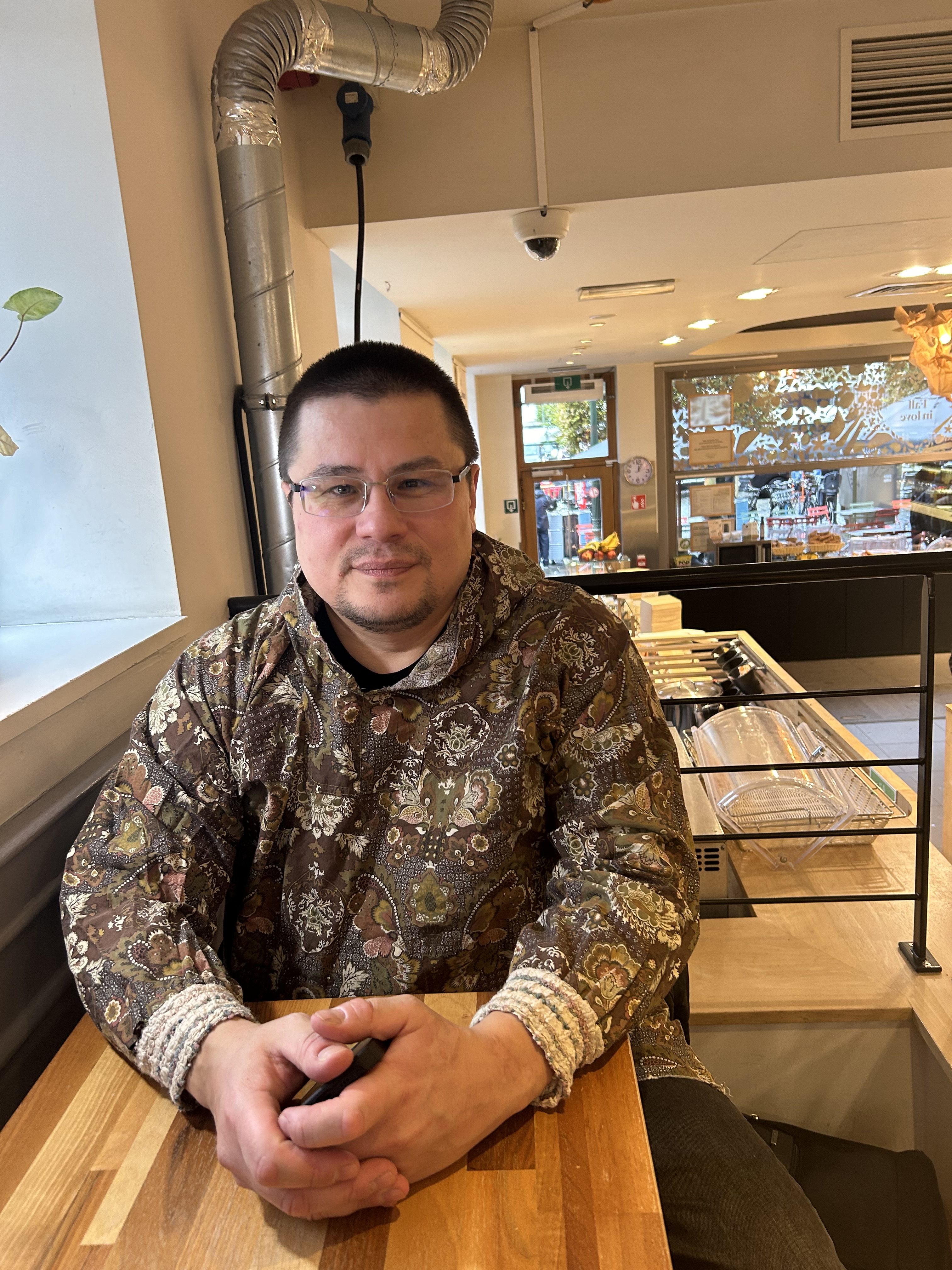In an interview with Jan Diedrichsen, Dmitri Berezhkov explains why he has not been able to return to his home in Russia for a long time, what the current regime means for him and his family and how he imagines Russia after Putin.
Dmitri Berezhkov has lived in Norway for over a decade. His political commitment to the indigenous peoples of the Russian Federation has driven him from his homeland. He is an Itelmene from Kamchatka and editor-in-chief of the website “Indigenous Russia” as well as co-founder of the “International Committee for Indigenous Peoples of Russia” (ICIPR).
I meet Dmitri on a rainy, uncomfortable fall day in Brussels. Everything as usual? Not quite: the nervousness in Brussels is almost palpable. One demonstration follows the next on the streets of the European Quarter. After the cowardly murder of two Swedish soccer fans, the security situation is even tenser. The tension is also palpable in the European Parliament, at the many events and political discussions.
In such tense, geopolitically dramatic times, who is interested in the threatened peoples and minorities of Russia? In conversation, Dmitri immediately makes it clear that he no longer wants to be an activist. I ask him, slightly surprised, what he means by this, as he is one of the most prominent indigenous voices in the diaspora and laughingly confirms that the Russian security apparatus continues to keep a very close eye on what he is up to abroad. He is skeptical as to whether the current approach to working for the threatened peoples is really effective: “We have to be honest, as activists we can hardly achieve anything. We don’t really make a difference for our peoples. We may be invited and allowed to submit reports – but what good does it do for our communities?” says Dmitri, who sees his personal future at the interface between science and politics.
“We have to document what is happening right now and we have to prepare for a time after Putin,” says Dmitri. He does not sound defeatist, but continues to be combative when he talks about the scandalous exploitation of nature in the Far North of Russia, where numerous European and German companies are still making a profit.
Almost incidentally, he talks about how his brother-in-law was recruited to the front from the street – against his will. It is the indigenous peoples who have to pay a particularly high price for the imperial phantom pains of Vladimir Putin and his revanchist Russia. As so often in the past, the soldiers for Russia’s bloody wars are not recruited in Moscow or St. Petersburg, but in the vast expanses of territories stolen by the Russian colonizers. The blood toll among the indigenous peoples in this war is correspondingly high.
But what will Russia look like after Putin? According to Dmitri, there is currently a lot of talk among the opposition (all of whom live abroad or have to operate underground) about the decolonization of Russia. That many Russians continue to cling to the misconception that the Russian Federation only consists of Russia. And that only Russians live in Russia. In its history, Russia has stolen its territories in the tradition of the colonialism of the European empires. Russia has never broken with its colonial past, but sees the conquests from the 18th century to the present day as a return to “Mother Russia”.
“It is crucial for the indigenous peoples of Russia that the Russian state and society recognize the historical fact of colonization. This could be the starting point for a new, fairer relationship between the indigenous peoples and the state. Such recognition is the first step towards national reconciliation, as has taken place in Canada, Norway, Australia and other countries with a history of injustice towards their indigenous peoples,” explains Dmitri, who knows that this vision of Russian decolonization is currently completely hopeless.
“Liberation from Russia’s authoritarian regime could quickly turn us into citizens of a new authoritarian country. The bitter reality is that there is virtually no prospect that the small populations of indigenous peoples in Russia’s Far North, Siberia and the Far East will ever have the luxury of self-determination in the form of independent states. No matter how the political situation in Russia develops, we will probably be living in a somebody’s country,” says Dmitri, adding: “Numerous other problems stand between our peoples and their self-determination. We suffer from the lack of qualified specialists, the geographical isolation of our ancestral territories, the low level of education of our people and insufficient financial resources. In addition, in the regions that are our ancestral homeland, we only make up a minority of the population for the most parts of the country.”
An important prerequisite for survival and further development as independent nations is therefore not the ability to establish and govern their own state, but meaningful political participation.
“Our institutions of self-government must have the ability to ensure that our hunters, fishermen and herders have access to their traditional lands and resources, that our cultures and languages are preserved and that our peoples have the opportunity to realize their political, economic and social potential,” says Dmitri.
After the conversation on a rainy day in Brussels, I am left somewhat ashamed, as I so often am after such meetings, because my best offer of support is to express my understanding and affection. But Dimitri can’t buy anything in return. He is hardly short of explanations of understanding. He was delighted with my invitation to get to know the German-Danish border region. And even if Dimitri no longer wants to be an activist, he is a prime example of a good and courageous representative of his people.
JAN DIEDRICHSEN

